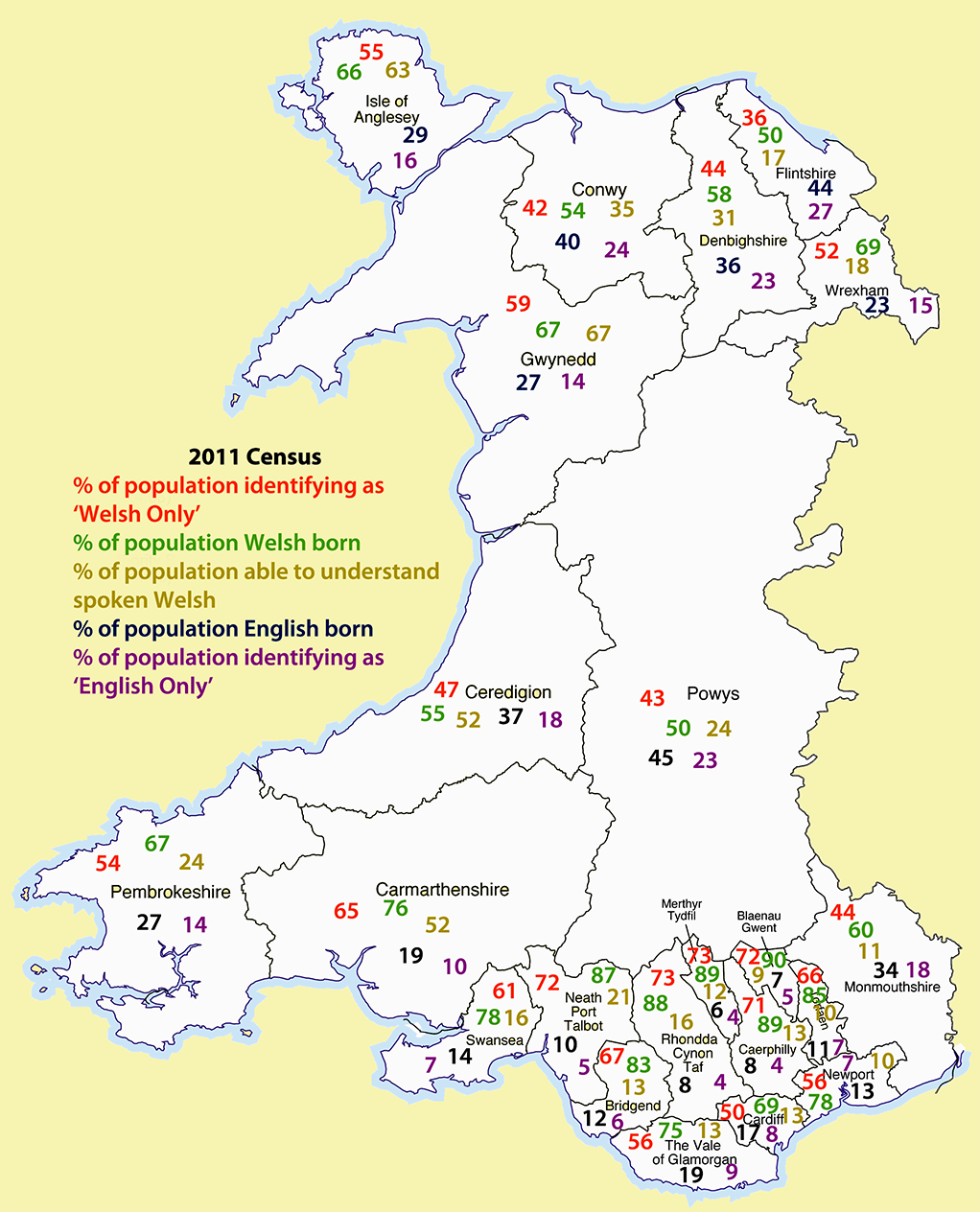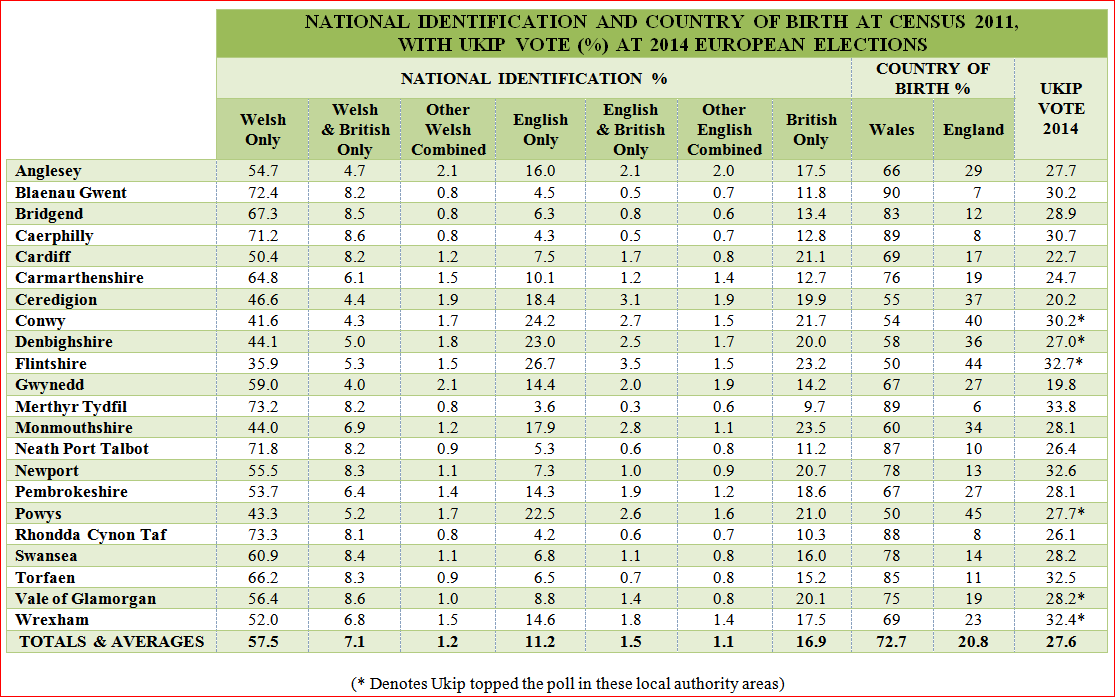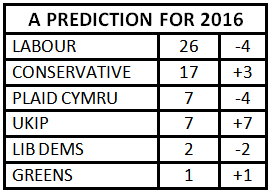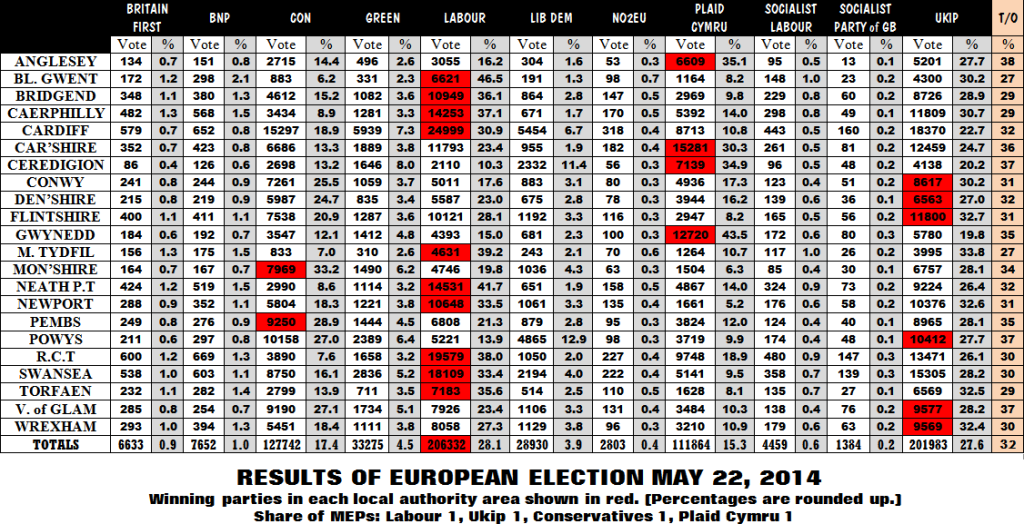Last Saturday night, whilst yet again sacrificing my sobriety for the Argentine economy – a very nice Viñalba Patagonia Sauvignon-Merlot – I rummaged through the various images and tables I’ve compiled over the years and came across one I decided was worth putting out again, on Twitter. It was very well received. (Possibly because I can’t be sure I’ve ever used it before.)
In fact, it took wings. At the time of posting it’s up to 7,444 Impressions, 1,230 Total engagements, 720 Media engagements, etc., etc. Must be one of the most popular tweets I’ve put out. Anyway, those who missed it can see it below (click to enlarge). It takes various statistics from the 2011 Census and locates them on a map of the 22 local authorities.
Some of the feedback I got tried to link the large numbers of English people resident in certain areas with the increase in support for Ukip. In fact, this seems to be a common explanation for the rise of Ukip in Wales, used by nationalists and even those of a more British orientation. In this interpretation, Ukip is another form of English nationalism, just a bit less virulent and less openly racist than the British National Party.
Yet I knew this couldn’t be true because of the support for Ukip in the Valleys, at both the May 2014 European elections and the 2015 UK general election. But even so I thought it might be worth going back to the 2011 Census to compile a table showing the various factors that might prove / disprove this theory, or otherwise explain what’s happening.
Before unveiling the new table you can remind yourselves of the 2014 Euro election results with the table below that I produced at the time (click to enlarge), the results of the 2015 UK general election are here, and an analysis can be found in my review of that contest here.
The statistics I’ve used to compile the new table are, first, the different labels people chose to use when identifying themselves in terms of nationality; then, whether born in Wales or England, and finally, the Ukip vote in the 2014 Euro elections.
It had to be done this way because the Census stats are given by local authority area, with the Euro vote available by the same divisions. The 2015 UK general election results were of course given by constituency, and while most constituencies can be grouped within local government boundaries there are some that straddle council borders, one being Carmarthen West and South Pembrokeshire, which makes aligning constituencies with council areas very difficult.
Even so, the pattern is consistent. Those areas that gave support to Ukip in 2014 also gave support in 2015, though at roughly half the 2014 level in percentage terms, 13.6% against 27.6%. (Also worth bearing in mind is that the turnout for the Euros was 32% and for the 2015 general election 65%.) This was entirely predictable, more noteworthy, and a better guide to the increasing level of support, was that the Ukip vote went up from 2.4% in the 2010 general election to 13.6% in 2015.
As I started collecting the figures and adding them to the new table, it soon became apparent that there isn’t a single answer to explain the rise of Ukip in Wales – there are two!
First, and as I suggested above, in the Valleys authorities, with their small percentages of English residents, most Ukip support must come from people who identified in the 2011 Census as ‘Welsh Only’. (The same can be said to some extent of the cities.) Which might be seen as holing below the waterline the idea that Ukip is nothing more than an English nationalist party, or at least suggesting that other factors are at work in the urban areas of the south.
Yet the more rural areas do tend to support the ‘English nationalist’ interpretation, especially in the north. Travelling along the coast from west to east we see that Ukip topped the polls in 2014 in Conwy (with 30.2%), Denbighshire (27.0%), and Flintshire (32.7%). Given the makeup of the population in this region it is entirely reasonable to assume that the majority of Ukip’s support comes from those identifying as English or British, with most of these born in England.
Elsewhere we find results that may have been shaped by other factors. For example, Ukip’s relatively low vote in Ceredigion (20.2%) can perhaps be attributed to indigenes and academe combining to reject M. Farage. The same factors may have been at work in Gwynedd, where Ukip saw it’s worst result (19.8%). Perhaps the Welsh language also played a part. Back in the north east, it has been suggested that the Wrexham figure (32.4%) was influenced by the large numbers of EU migrants in the town.
Others may see pointers I’ve missed, or simply choose to come to different conclusions. But we can be sure that a party that gained the same 30.2 per cent in areas as diverse as Conwy and Blaenau Gwent is in one sense a national party, and in another sense, a party appealing to two different constituencies in the same country.
If I wanted to be provocative (though as you know it’s not in my nature) I could argue that Ukip is the only truly national party in Wales. That Ukip is the only party with support across the country, from golf club Blimps on the Costa Geriatrica to the helpless and the hopeless in the Heads of the Valleys.
Who’s to blame for this? Obviously Plaid Cymru. First, for lacking the balls to oppose the colonisation of our rural areas. Second, for being so utterly insipid, so ‘Let’s-cwtch-up-to-Labour’, that the party has no appeal for thousands upon thousands of people in the south who are pissed off with Labour and seeking another party to vote for.
That these desperate people, these ‘Welsh Only’ identifiers, have found Ukip more attractive than Plaid Cymru says more than words could ever say, and everything you need to know about Plaid Cymru.
Maybe for next Christmas some enterprising and politically astute manufacturer of novelties will have crackers containing the puzzler:
Q: Who is responsible for the popularity in Wales of the English nationalist Ukip?
A: The ‘Welsh nationalist’ Plaid Cymru!
Next time you hear a Plaidista get on their high horse and adopt a tone of moral superiority vis-à-vis Ukip, trying to tell us what a parcel of rogues they are, remind them who created this monster.













